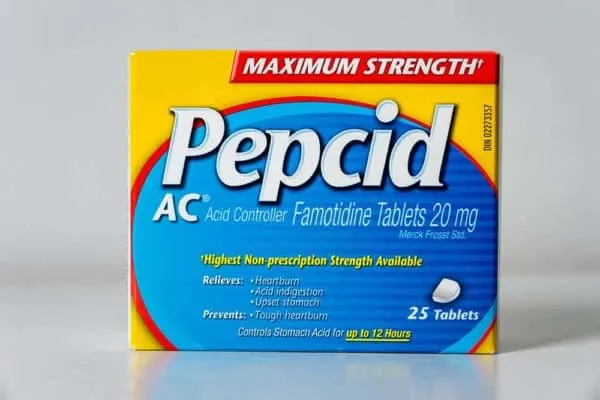Are Over-the-Counter Human Medications Safe for Dogs?
When your dog is ill, it can be worrying — especially if they are vomiting. In such a situation, you may be tempted to reach into your medicine cabinet and give your furry friend medications that have worked for you in the past.
However, not all over-the-counter medications are safe for dogs. Even the most common OTC products may provoke allergic reactions and lead to other unforeseen consequences.
If you are concerned about your dog’s health, visit your local veterinary practice.
A trained vet is always the best person to look to when seeking advice about your dog. They will be able to propose the best treatment and medication for the dog.
Never assume it’s okay to use any medication on your dog without a vet’s advice.
That said, we can recommend a handful of potential treatments that are usually safe for canines.
When your dog’s condition is persistent, and there’s no option for a quick consult with a vet, using these OTC medications can help mitigate the underlying health issue.
What Over-The-Counter Medications Can Dogs Take for Nausea and Motion Sickness?
In most cases, your veterinarian will recommend a treatment designed explicitly for canines for your dog to take. But that is not always the case. Sometimes, the vet may prescribe common over-the-counter medications that are used to treat digestive issues in humans.
If your canine companion is suffering from nausea or sickness, medications like Pepcid and Dramamine could relieve your dog’s symptoms without exposing them to unnecessary danger.
Pepto-Bismol
When a dog is suffering from nausea, your veterinarian may recommend Pepto-Bismol. It’s an OTC anti-nausea medication many people already have in their homes.
This treatment is typically given for diarrhea, but it could also help with nausea and vomiting.
Pepto-Bismol contains bismuth subsalicylate. Generally, it is quite safe for most dogs to take. Still, caution is recommended.
When it comes to the dosage, you want to give the dog one teaspoon of the treatment for every 10 pounds they weigh. It’s crucial to stay within this service size. The treatment can be given every 8 hours.
After a few doses, you will want to speak to your veterinarian since it’s not a treatment that should be given regularly.
It’s worth noting that this medication can cause black stools. If used too frequently or too long, it can lead to gastrointestinal upset and gastric bleeding.
Pepcid
Pepcid is another human medication that can be helpful for dogs with nausea. Its primary use is to help regulate stomach acid and gastric ulcers.
Similar to cimetidine, it can help with nausea and other digestive issues.

The active ingredient in Pepcid is famotidine, and it is an effective treatment to consider. Alternatives to this medicine include Tagamet and Zantac (ranitidine).
The recommended dosage will change depending on the size of the dog. For example, one 10 mg tablet in a 24-hour period is suitable for dogs that weigh 20 pounds.
Only regular Pepcid should be administered to your dog. The maximum strength version may cause unwanted side effects.
Again, you should consult your vet before giving your dog this medicine.
Dramamine
If your dog’s nausea and sickness are linked to travel, Dramamine can be an effective treatment. It is a form of antihistamine considered safe for dogs to consume.
If you want to use this medication, you will want to treat your dog at least half an hour before travel.
While dog-specific anti-sickness medications can be given for motion sickness, it is a helpful option to consider if it is the only medication you have access to.
Usually, around 2 milligrams should be given per pound of the body weight in an 8-hour period. Talk to your vet about the precise dosage.
It is only recommended that you use this treatment if you plan to travel with your dog.
Imodium
When it comes to diarrhea and other stomach issues, Imodium is a treatment that is commonly recommended by veterinarians.
While this is not a specific anti-nausea medicine, it can stop stomach spasms. In turn, this can ease nausea and stomach discomfort.
1 mg for every 20 pounds of body weight is a safe option.
Keep in mind that it is not a long-term treatment but rather a short-term solution. Only give your dog one dose. If the diarrhea does not subside, contact your veterinarian.
Can You Use OTC Pain Meds for Dogs?

Pet parents frequently depend upon pain medications to ease their furry friends’ discomfort. These solutions are convenient and readily available. However, these pills are among the most hazardous options for pets.
This truth is reflected in the fact that when our four-legged companions consume these over-the-counter pain relievers, it can lead to severe health complications. These risks should never be overlooked or underestimated, as they can result in fatal outcomes.
Thus, while they might offer quick alleviation of pain, their associated dangers shouldn’t be ignored.
Here are some pain relievers you may consider giving your dog.
Acetaminophen
Dogs should not be given over-the-counter pain medicines that contain acetaminophen (found in Tylenol). This medication can lead to serious health problems in dogs.
One of the major issues that can arise is gastrointestinal difficulty. When a dog consumes this pain reliever, it may experience harmful consequences. Some examples include severe abdominal pain and bloody feces.
There are additional symptoms and side effects to consider as well. Many of these can become life-threatening for the animal.
NSAIDS
Non-steroidal anti-inflammatory drugs, known as NSAIDs, are a common choice in the field of veterinary medicine. Yet, despite their frequent usage, a word of caution is needed.
Well-known medications such as ibuprofen, Advil, and Motrin actually have the potential to trigger some rather unsavory side effects in our beloved pets. In some situations, they may even lead to seizures.
As for aspirin, specifically the buffered variant, it’s considered less risky. Nevertheless, the advice from most vets is to steer clear from it, too.
Like acetaminophen and ibuprofen, aspirin can also pose significant health risks to dogs. Hence, it is advisable to refrain from using most human over-the-counter pain relief options for dogs.
Current FDA-approved NSAIDs for dogs include:
- Carprofen (Rimadyl, Vetprofen)
- Deracoxib (Deramaxx)
- Firocoxib (Previcox)
- Grapiprant (Galliprant)
- Meloxicam
What Allergy Medications Are Safe for Dogs?
When it comes to common OTC allergy medications for dogs, antihistamines top the list. These medications are generally safe for our canine friends. But, just as humans do, dogs can experience varying side effects.
In some cases, dogs may become drowsy after taking antihistamines. Other times, they may show signs of hyperactivity.
The most popular options are:
- Benadryl (diphenhydramine)
- Claritin (loratadine)
- Zyrtec (cetirizine)
However, these OTC antihistamines can sometimes include additional ingredients, such as decongestants, which can be detrimental to a dog’s health. Therefore, you should pay close attention when purchasing these medications.
To ensure the safety and effectiveness of treatment, always read the label. Make sure the product is an antihistamine-only option, without any other added active ingredients.
Is It Safe to Give Your Dog Cough Medicine?

Debating about giving your dog cough medicine? The safety of it is something you should consciously consider.
While some variations of cough syrups can be safe for dogs, others could pose grave risks. More often than not, these hazards aren’t worth running.
Some cough syrups may contain compounds that are toxic to dogs, like acetaminophen. Moreover, the dosage calculated in human terms might be severely excessive for dogs.
Summary
As you can see, there are a number of over-the-counter medications that can be given to dogs who are nauseous. However, you should always speak to your vet before administering any of these treatments.
In the world of vet medicine, specific conditions determine the appropriateness of medications. Your vet’s take on this should be your guidepost.
Consulting your vet before giving your nauseous dog these medications will ensure the treatment process is safe, effective, and tailored to your dog’s specific health needs.
Frequently Asked Questions
Can I give my dog antibiotic ointment?
Yes, antibiotic ointments can often be used in dogs to treat minor cuts or scrapes. Still, it’s best to consult your vet before using any medication on your dog.
Are antibiotics safe for dogs?
Yes, antibiotics can be used in dogs to treat bacterial infections. That said, use antibiotics only under the guidance of a veterinarian.
Can I use over-the-counter pain medications for my dog?
As a rule of thumb, over-the-counter pain medications meant for humans should not be given to dogs. These medications can be toxic to dogs and may cause serious health problems.
What should I do if my dog ingests something toxic?
If your dog ingests something toxic, do not induce vomiting without consulting with your vet. Some substances can cause more harm if vomited back up.
Can I give my dog cold medications?
Most cold medications aren’t safe for dogs. They may contain ingredients, such as decongestants, that can be harmful to dogs. Consult with your vet for safe alternatives.
How much over-the-counter medication can I give my dog?
It’s best to consult with your vet before giving any over-the-counter medication to your dog. The appropriate dosage may vary based on your dog’s size, weight, and health condition.
Can I give my dog loperamide for diarrhea?
You should not give your dog loperamide or any other medication without discussing it with your vet first. Diarrhea in dogs can have various causes and should be evaluated by a professional.
Are there any human medications that are safe for dogs?
Some human medications, such as antihistamines or certain pain relievers, may be safe under the guidance of a veterinarian. Always consult with your vet before giving any medication to your dog.
Can I sedate my dog with over-the-counter human medications?
No, you should never attempt to sedate your dog with over-the-counter human medications. Sedation should only be done under the supervision of a veterinarian.



















